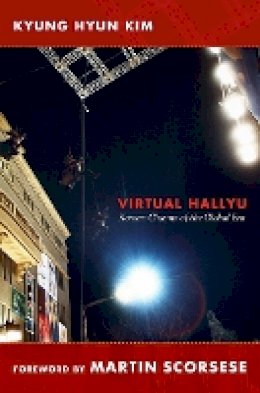
Virtual Hallyu: Korean Cinema of the Global Era
Kyung Hyun Kim
In the late 1990s, South Korean film and other cultural products, broadly known as hallyu (Korean wave), gained unprecedented international popularity. Korean films earned an all-time high of $60.3 million in Japan in 2005, and they outperformed their Hollywood competitors at Korean box offices. In Virtual Hallyu, Kyung Hyun Kim reflects on the precariousness of Korean cinema’s success over the past decade. Arguing that state film policies and socioeconomic factors cannot fully explain cinema’s true potentiality, Kim draws on Deleuze’s concept of the virtual—according to which past and present and truth and falsehood coexist—to analyze the temporal anxieties and cinematic ironies embedded in screen figures such as a made-in-the-USA aquatic monster (The Host), a postmodern Chosun-era wizard (Jeon Woo-chi), a schizo man-child (Oasis), a weepy North Korean terrorist (Typhoon), a salary man turned vengeful fighting machine (Oldboy), and a sick nationalist (the repatriated colonial-era film Spring of Korean Peninsula). Kim maintains that the full significance of hallyu can only be understood by exposing the implicit and explicit ideologies of protonationalism and capitalism that, along with Korea’s ambiguous post-democratization and neoliberalism, are etched against the celluloid surfaces.
Product Details
About Kyung Hyun Kim
Reviews for Virtual Hallyu: Korean Cinema of the Global Era
Travis Workman
Journal of Asian Studies
“[T]his is a book that needs to be read by anyone who is interested in the field [of Korean Cinema].”
John Finch
Asian Studies Review
" . . . Kim's book is special in that every effort was exerted to select the most relevant topics and issues for readers in a comprehensive and sophisticated way. I would recommend this book because it is a well-written and detail-oriented account of Korean movies . . . As all chapters are very informative and engage in theoretical arguments that are not just descriptive, this book will be very useful to readers who really love Korean films or are film majors in graduate programs and would like to gain a comprehensive knowledge of Korean cinema."
Sang Yee Cheon
Korean Studies
